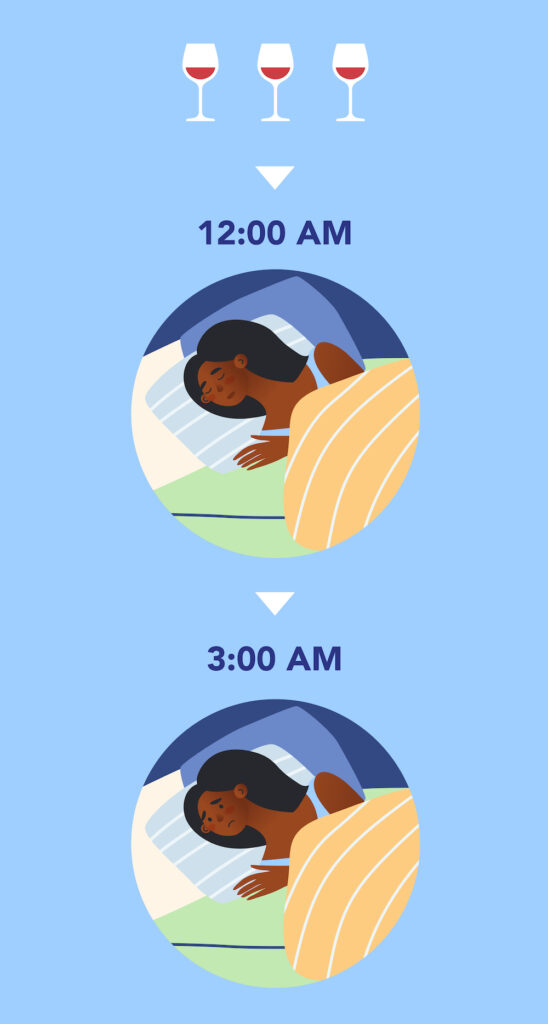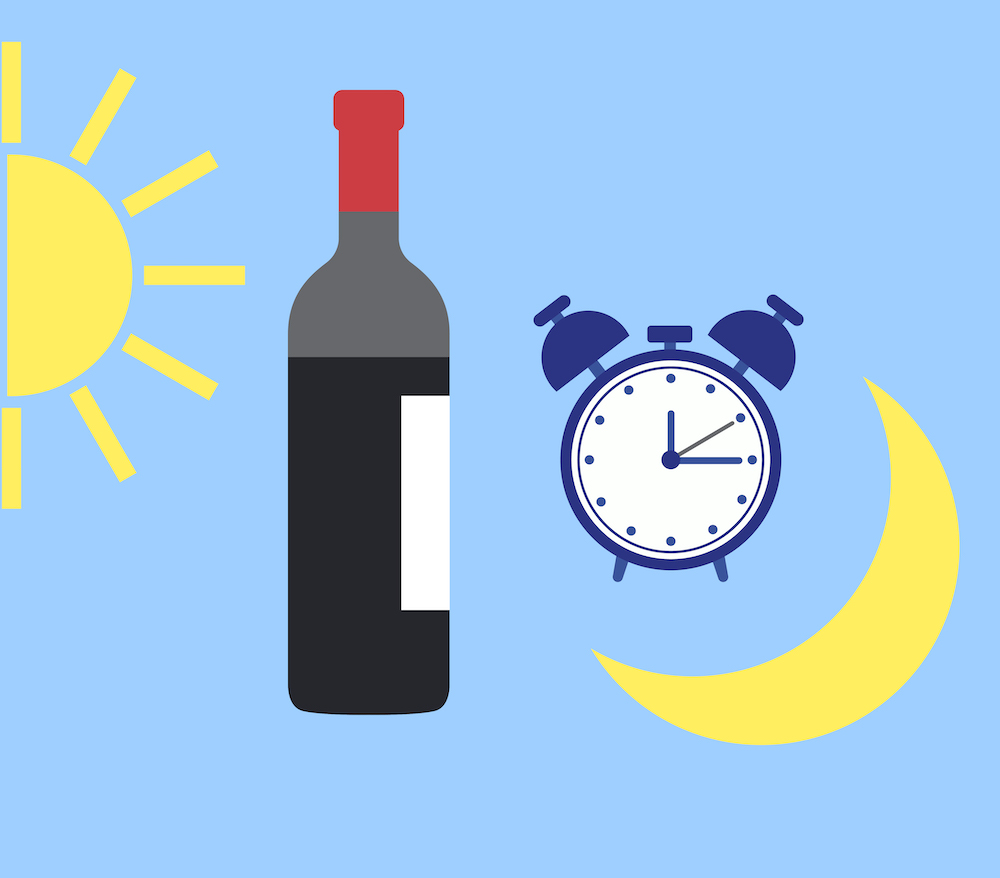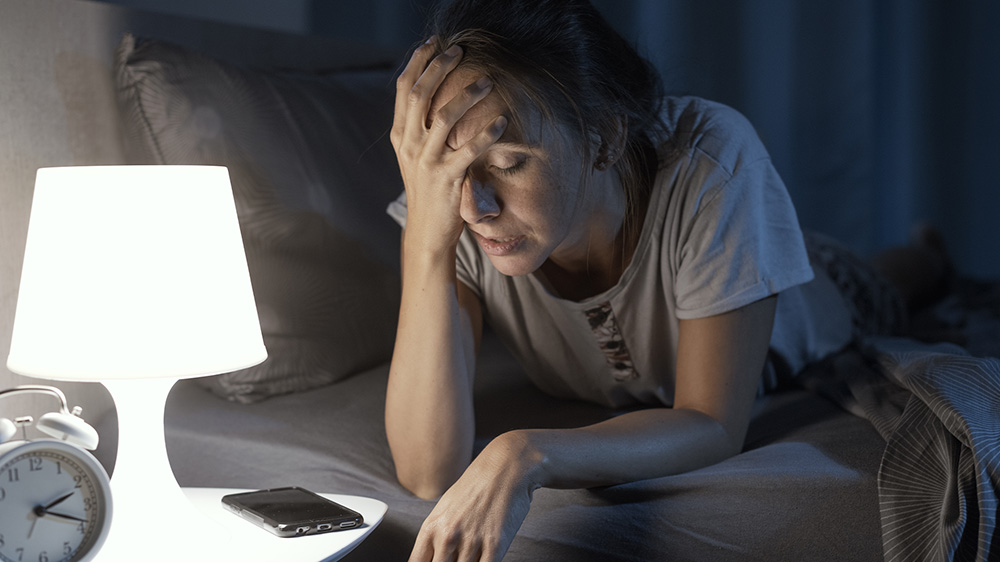Alcohol and Sleep
- by Sharon Brandwein
- Updated: June 12, 2024

While libations aren’t marketed as such, alcohol is (anecdotally) the most popular sleep aid in the world. But alcohol and sleep have a tricky relationship. While your favorite potable can help you fall asleep more quickly, that’s where the benefits come to a screeching halt. According to our own director of sleep health, Dr. Shelby Harris, “[Alcohol] is great to fall asleep with, but it wears off pretty quick, and when it wears off, it messes with the quality of sleep you have.”
And the research shows us as much. Instead of deep, restful sleep, you’re more likely to find nighttime awakenings, lower sleep quality, and reduced sleep efficiency at the bottom of your glass. And while you might think that a glass or two to take the edge off the day can’t hurt, you should know that it doesn’t take much alcohol to change your sleep patterns and harm your health.
Note: The content on Sleepopolis is meant to be informative in nature, but it shouldn’t take the place of medical advice and supervision from a trained professional. If you feel you may be suffering from any sleep disorder or medical condition, please see your healthcare provider immediately. Additionally, if you’re looking to decrease your alcohol use and feel you drink in excess, it’s best to contact your healthcare professional before doing so, as quitting alcohol abruptly can cause severe complications for exess drinkers.
Long Story Short
- Alcohol can help you fall asleep faster but will likely negatively impact your sleep quality and lead to frequent waking.
- Alcohol can make some people more vulnerable to sleep apnea or exacerbate the symptoms for those who already have it.
- If you choose to indulge in a drink or two in the evening, it’s best to stop drinking about four hours before bedtime.
- The recommended alcohol intake is much lower than most people realize — two drinks or less per day for men, and one drink or less per day for women.
How Alcohol Affects Sleep
“Alcohol is a depressant for the brain, which means it has a sedative effect — the more alcohol you consume, the sleepier it will make you feel,” says Dr. Chelsie Rohrscheib, head sleep expert and sleep scientist at Wesper. “Drinking alcohol, especially at nighttime, increases your drive to sleep and makes it easier to fall asleep for most. However, it negatively impacts sleep quality by changing the way we cycle through our sleep stages, and it causes frequent awakenings.”

She adds, “Drinking alcohol causes excessive urination, so your trips to the bathroom during the night will be more frequent. It also affects your breathing by over-relaxing the muscles of the upper airway, which can cause snoring and sleep apnea.”
Alcohol and Sleep Architecture
Beyond tinkering with your ability to sleep soundly and promoting frequent bathroom trips, alcohol can also wreak a little havoc on your sleep architecture (the organizational structure of your sleep stages and how you move through the various sleep cycles).
“Initially, alcohol reduces the amount of time it takes to enter stage 3 — Non-REM, slow-wave sleep, the deepest sleep stage where we are mostly unconscious,” says Rohrscheib. And when we pair decreased sleep latency with findings that “people who have consumed alcohol stay in deep sleep longer (especially for the first half of the night), this frequently gives us the impression that alcohol improves sleep.” But once the alcohol begins to metabolize, Rohrscheib tells us it winds up having the opposite effect.
REM Sleep
While most people think REM sleep is the deepest stage of sleep, it’s actually the lightest sleep stage next to N1. The N3 sleep stage, where we experience slow-wave sleep, is the deepest stage of sleep.
“During the second half of the night, the new chemicals created by our liver metabolizing alcohol are extremely wake-promoting and act like a stimulant,” says Rohrscheib. “Ultimately, this can impact the brain’s ability to enter REM sleep, the stage where we [do most of our memorable] dreaming. Instead of spending a sufficient amount of time in REM, our sleep becomes very fragmented, and we wake up frequently and are often more restless in the second half of the night.”
The TLDR: Alcohol initially allows us to get lots of deep sleep, but it contributes to a lack of quality REM sleep and reduces overall sleep quality. And according to Rohrscheib, this series of events is what ultimately contributes to grogginess, headaches, and excessive sleepiness the next day.

Does the Amount of Alcohol Matter?
If you fancy a glass of wine with dinner or a nightcap before bed, you might want to cap the Chiante and put the Negroni down — research shows that even low alcohol intake can stymie your sleep.
In 2018, Finnish researchers analyzed alcohol consumption and the night of sleep that followed for 4,098 adults between the ages of 18-65. Ultimately, they found that:
- Low alcohol intake decreased sleep quality by 9.3 percent
- Moderate alcohol intake decreased sleep quality by 24 percent
- Heavy alcohol intake decreased sleep quality by nearly 40 percent
More findings from the study include:
- Alcohol affected men and women similarly
- Alcohol affected active and sedentary individuals similarly
- Alcohol (interestingly) had a more profound effect on younger people
Can Alcohol Cause Insomnia?
It’s likely that most people reach for the hard stuff to help them sleep because alcohol, for all intents and purposes, is a sedative. And no one will argue that it can shorten sleep latency (the time it takes you to fall asleep). However, the problem with alcohol and sleep often appears as the night progresses. Ultimately, your overall sleep quality will take a hit as the alcohol starts to metabolize and its effects begin to wear off. And when this happens night after night, you’ll find yourself dealing with insomnia.
“The chemicals that are metabolized when alcohol is broken down are very wake-promoting and cause sleep fragmentation,” says Rohrscheib. “Ultimately, some people may find it very difficult to fall back to sleep once they’ve woken up in the middle of the night.”
Alcohol and Sleep Disorders
Those with sleep disorders should proceed with extra caution before reaching for that evening drink. Research shows that it can increase the risk of certain sleep disorders and parasomnias while exacerbating the symptoms of others.
Sleep Apnea
Rohrscheib says alcohol also impacts breathing. Ultimately it can make some people more vulnerable to sleep apnea or exacerbate the symptoms for those who already have it.
And there are plenty of studies to corroborate the claim. Two studies from 2018 show that alcohol consumption can increase the risk of sleep apnea by as much as 25 percent, while others found that alcohol use increases a person’s apnea-hypopnea index (AHI), which is a measure of how many times per hour a sleeper’s breathing becomes restricted or that they stop breathing altogether. In addition to increasing AHIs, alcohol can also:
- Reduce blood oxygen levels
- Further relax muscles around the airway, contributing to exacerbated airway blockages
- Raise the arousal threshold — or require more stimulus to wake a person — so that apneas must be stronger and longer to wake the sleeper
While researchers have yet to definitively prove that alcohol is associated with other sleep disorders, moderate to heavy consumption has been linked to:
- Parasomnias such as sleepwalking, sleep talking, and sleep-eating
- Restless leg syndrome
Alcohol and Other Health Risks
Beyond meddling with your sleep and provoking symptoms of sleep disorders, light to heavy alcohol consumption can also alter your gut’s microbiome, which may raise the risk of infection. And if that weren’t plenty, Dr. Monique May, a Board-Certified Family Physician and Medical Advisory Board Member at Aeroflow Sleep, tells Sleepopolis, “Long-term abuse of alcohol can result in fatty liver, cirrhosis (which is scarring of the liver), liver cancer, and bleeding problems. It can also cause swelling, confusion, brain damage, chronic inflammation of the pancreas, high blood pressure, and kidney problems.”
Still not convinced to skip the nightcap? Research shows that heavy alcohol consumption can also raise your risk of:
- Some cancers, including stomach cancer and pancreatic cancer
- Stroke
- Accidents
Alcohol Consumption – How Much Is Too Much?
“A glass of wine or beer with dinner is unlikely to have a major impact on your sleep. However, having a nightcap places you at risk for poor sleep quality,” says Rohrscheib. “It’s also important to note that the more alcohol you consume, the longer it takes for your body to metabolize it and get it out of your system. Therefore, If you drink to excess in the afternoon or early evening, it could still impact your sleep.”
The recommended intake of alcohol is often far less than people might think. “For men, it’s two drinks or less per day, and for women, it’s one drink or less per day,” says May. And if you choose to indulge, she adds, “The recommendation is to cut off drinking alcohol four hours before bedtime. This gives your liver time to break down the alcohol.”
What To Do After Drinking Too Much Before Bed

“If you drank too much alcohol in the evening, prepare yourself for a poor night of sleep,” Rohrscheib warns. And while she doesn’t mince words here, Rohrscheib offers a few tips and best practices to help you get at least some of your forty winks. To reduce the impact of wine with your dinner, she says:
- Expect your sleep to be very fragmented, so plan on sleeping longer than usual to increase your total sleep time and reduce the impact alcohol has on your sleep quality.
- Make sure your bedroom is calm, dark, cool, and comfortable to minimize disturbances during the night.
- Try to make sure you are well-hydrated by drinking plenty of water.
- Eating before you drink may reduce the impact of alcohol on your stomach and prevent alcohol-associated nausea.
- If you’re prone to snoring, try to sleep on your side instead of your back to help keep your airways open.
Though these suggestions may help you get through the night a bit more painlessly, they won’t reverse the impact alcohol has on sleep quality. The best way to protect sleep is to cut off your drinking earlier in the day or forgo drinking entirely.
The Last Word From Sleepopolis
Anyone who has experienced a restless night after a few drinks can attest to alcohol’s disruptive effect on sleep. Though alcohol can increase drowsiness and reduce the time it takes to fall asleep, it can ultimately reduce sleep quality and change sleep patterns. Moreover, alcohol can reduce the time spent in one sleep cycle while increasing the time spent in another.
Alcohol consumption can lead to insomnia, sleep apnea, and a host of other health issues. As a best practice, those who choose to indulge should stop drinking at least four hours before bed. Staying hydrated, eating bland foods, and steeling yourself for a rough night are good ideas too.
FAQs
When should I stop drinking to avoid affecting my sleep?
It’s best to cut off drinking alcohol at least four hours before bedtime. This gives your liver time to break down the alcohol and might give your sleep a fighting chance.
Why does alcohol make you wake up early?
As alcohol is metabolized in the body and broken down into new chemicals, it has a stimulant-like and wake-promoting effect.
Sources
He, S., Hasler, B. P., & Chakravorty, S. (2019b, December). Alcohol and sleep-related problems. Current opinion in psychology. https://www.ncbi.nlm.nih.gov/pmc/articles/PMC6801009/
Jones, M. R., Brandner, A. J., Vendruscolo, L. F., Vendruscolo, J. C. M., Koob, G. F., & Schmeichel, B. E. (2022, February 22). Effects of alcohol withdrawal on sleep macroarchitecture and microarchitecture in female and male rats. Frontiers. https://www.frontiersin.org/articles/10.3389/fnins.2022.838486/full
Obstructive sleep apnea. Obstructive Sleep Apnea | Johns Hopkins Medicine. (2021, August 8). https://www.hopkinsmedicine.org/health/conditions-and-diseases/obstructive-sleep-apnea
Pietilä, J., Helander, E., Korhonen, I., Myllymäki, T., Kujala, U. M., & Lindholm, H. (2018, March 16). Acute effect of alcohol intake on cardiovascular autonomic regulation during the first hours of sleep in a large real-world sample of Finnish employees: Observational Study. JMIR mental health. https://www.ncbi.nlm.nih.gov/pmc/articles/PMC5878366/
Britton, A., Fat, L. N., & Neligan, A. (2020, March 24). The association between alcohol consumption and sleep disorders among older people in the general population. Nature News. https://www.nature.com/articles/s41598-020-62227-0
Simou, E., Britton, J., & Leonardi-Bee, J. (2018, February). Alcohol and the risk of sleep apnoea: A systematic review and meta-analysis. Sleep medicine. https://www.ncbi.nlm.nih.gov/pmc/articles/PMC5840512/
Alcohol as a trigger affecting symptom severity and frequency of slow … (n.d.). https://jcsm.aasm.org/doi/10.5664/jcsm.6738
U.S. Department of Health and Human Services. (n.d.). Alcohol and gut-derived inflammation. National Institute on Alcohol Abuse and Alcoholism. https://arcr.niaaa.nih.gov/volume/38/2/alcohol-and-gut-derived-inflammation
Osna, N. A., Donohue, T. M., & Kharbanda, K. K. (2017). Alcoholic liver disease: Pathogenesis and current management. Alcohol research : current reviews. https://www.ncbi.nlm.nih.gov/pmc/articles/PMC5513682/
Centers for Disease Control and Prevention. (2023, March 13). Alcohol and cancer. Centers for Disease Control and Prevention. https://www.cdc.gov/cancer/alcohol/index.htm
Centers for Disease Control and Prevention. (2022, April 19). Facts about moderate drinking. Centers for Disease Control and Prevention. https://www.cdc.gov/alcohol/fact-sheets/moderate-drinking.htm
